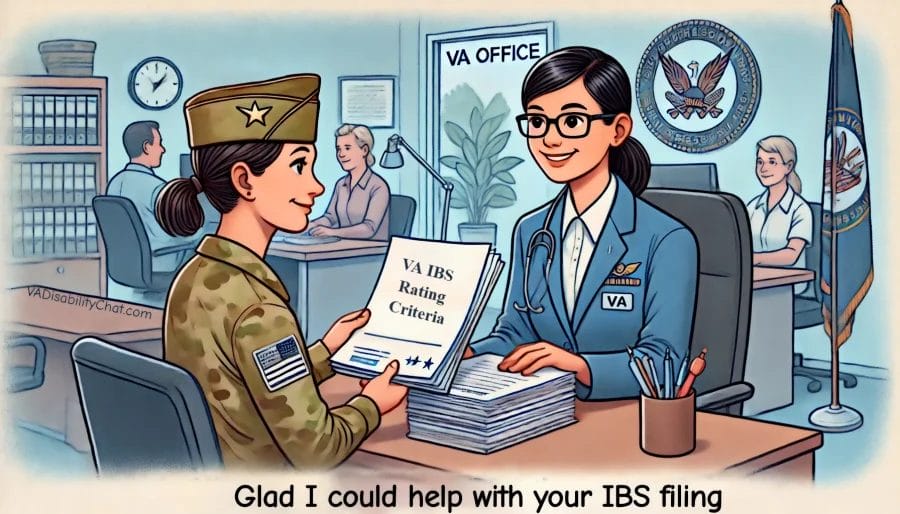This guide covers the IBS rating VA system in detail, including specific criteria from the VA rating schedule, steps to apply for a rating, and tips for navigating the process.
Irritable Bowel Syndrome (IBS) is a common but challenging condition for many veterans, especially those who served in high-stress environments. For veterans whose IBS symptoms disrupt daily life, the VA provides disability ratings that reflect the severity and frequency of symptoms.
What is IBS, and How Does It Affect Veterans?
IBS, or Irritable Bowel Syndrome, is a functional digestive disorder that causes abdominal pain and changes in bowel habits, such as diarrhea, constipation, or both. For veterans, IBS can be linked to stress, diet changes during service, or exposure to environmental factors, and symptoms often persist or worsen post-service. The VA recognizes IBS as a potentially disabling condition and assigns ratings based on symptom severity, as reflected in the IBS rating VA criteria.
AI Powered Chatbot for VA Disability Claims
Learn more about the VA Disability process and get help with our VA Disability Claim Chatbot programmed and trained by AI

IBS Rating VA: How the VA Evaluates Irritable Bowel Syndrome
The IBS rating VA system uses Diagnostic Code 7319 to assess IBS based on symptom frequency, severity, and impact on daily life. Ratings range from 0% to 30%, and the criteria are based on the presence of abdominal pain and at least two additional symptoms. Here is the specific VA rating criteria for IBS according to Diagnostic Code 7319:
30% Rating – Severe
A 30% rating is assigned for severe IBS, defined as:
- Abdominal pain related to defecation at least one day per week over the previous three months, and
- Two or more of the following symptoms:
- Change in stool frequency
- Change in stool form
- Altered stool passage (straining and/or urgency)
- Mucorrhea (mucus in stool)
- Abdominal bloating
- Subjective distension
This rating reflects severe symptoms that often disrupt daily life, making it difficult for veterans to work or carry out normal activities without frequent interruptions.
20% Rating – Moderate
A 20% rating is given for moderate IBS symptoms, which include:
- Abdominal pain related to defecation at least three days per month over the past three months, and
- Two or more of the symptoms listed above (change in stool frequency, stool form, altered passage, mucorrhea, bloating, or distension).
Veterans with a 20% rating experience frequent but moderate symptoms that impact daily activities, but not as severely as the 30% rating level.
10% Rating – Mild
A 10% rating applies to mild IBS, defined as:
- Abdominal pain related to defecation at least once during the previous three months, and
- Two or more of the symptoms listed above.
A 10% rating reflects mild symptoms that may require occasional treatment but generally allow veterans to function without major disruptions.
0% Rating
A 0% rating is assigned when IBS is diagnosed but produces only occasional symptoms with no significant impact on daily life. Veterans with a 0% rating do not receive monthly compensation but may qualify for VA healthcare benefits related to their IBS.

Establishing Service Connection for IBS
To qualify for an IBS rating VA, veterans need to establish a service connection for their condition. This connection can be established in several ways:
1. Direct Service Connection
A direct service connection requires medical evidence that IBS began during active duty. Veterans can submit service medical records that document symptoms or treatments for IBS or similar gastrointestinal issues while in service.
2. Secondary Service Connection
If IBS developed as a result of another service-connected condition, such as PTSD or anxiety, veterans may qualify for a secondary service connection. For example, stress and anxiety from PTSD can worsen IBS symptoms, making veterans eligible for an IBS rating as a secondary condition.
3. Aggravation of a Pre-Existing Condition
If a veteran had IBS prior to joining the service but experienced worsening symptoms due to service-related factors, such as high-stress environments or dietary changes, they may qualify for a rating based on aggravation.
Evidence Needed to Support an IBS VA Claim
Securing a VA disability rating for IBS requires thorough documentation to demonstrate the frequency and severity of symptoms. Here are the types of evidence that can support an IBS claim:
Medical Records
Provide comprehensive medical records from both VA and civilian healthcare providers. Records should document IBS symptoms, diagnosis, and treatments, including medications or dietary adjustments.
Service Medical Records
Service medical records are crucial for establishing a direct service connection. These records may include treatment for gastrointestinal symptoms, prescribed medications, or diagnoses received during service.
Personal Statements
Personal statements from family members, friends, or coworkers who have witnessed how IBS affects your life can strengthen your claim. Personal statements should detail the impact of IBS on daily activities, missed workdays, or other challenges related to the condition.
Applying for an Increased IBS Rating VA
If IBS symptoms worsen over time, veterans may qualify for a higher IBS rating. Here are steps to request an increased VA rating:
Step 1: Gather Updated Medical Documentation
Submit recent medical records that reflect an increase in IBS symptoms or treatment frequency. Documentation of additional symptoms, like severe abdominal pain or new medications, can support your request for a higher rating.
Step 2: File VA Form 21-526EZ
Complete and submit a VA Disability Claim on Form 21-526EZ to request an increased IBS rating. This form is used for requesting new claims or increased ratings.
Step 3: Request a VA Reexamination
In some cases, the VA may require a reexamination to assess the current severity of IBS. During this examination, describe your symptoms in detail, especially any new or worsened issues.
Step 4: Work with a Veterans Service Officer (VSO)
VSOs are knowledgeable about the VA claims process and can offer guidance on preparing a strong application. They can assist with gathering records, completing forms, and submitting your claim.
Common Mistakes to Avoid in an IBS VA Claim
Understanding IBS rating VA criteria is essential, and avoiding these common mistakes can improve your chances of a favorable decision:
Mistake 1: Insufficient Medical Documentation
Many claims are denied due to inadequate medical records. Ensure your records are thorough, documenting the severity and frequency of your IBS symptoms, treatments, and any new or worsening conditions.
Mistake 2: Not Including Secondary Conditions
IBS can lead to or worsen other conditions, such as anxiety or depression. Mentioning these conditions in your claim may increase your overall VA rating.
Mistake 3: Failing to Consult a VSO
The VA claims process can be complex. Working with a Veterans Service Officer (VSO) can simplify the process, as they can help compile necessary documents and strengthen your application.
Mistake 4: Downplaying Symptoms
Accurately describe how IBS impacts your daily life. Downplaying symptoms can lead to a lower rating or denial, so be specific and honest in detailing your experience.
What to Do if Your IBS VA Claim is Denied
If your IBS claim is denied or assigned a lower rating than expected, you have options to appeal:
1. Higher-Level Review
Request a Higher-Level Review if you believe the VA made an error in evaluating your original claim. This review is conducted by a senior reviewer who will reassess your case.
2. Supplemental Claim
If you have new evidence, submit a Supplemental Claim to strengthen your case. New medical records or updated statements from healthcare providers can improve your chances.
3. Board of Veterans’ Appeals
This formal appeal process involves a judge reviewing your case. It is typically pursued if other appeal methods have been unsuccessful and additional evidence is available.
